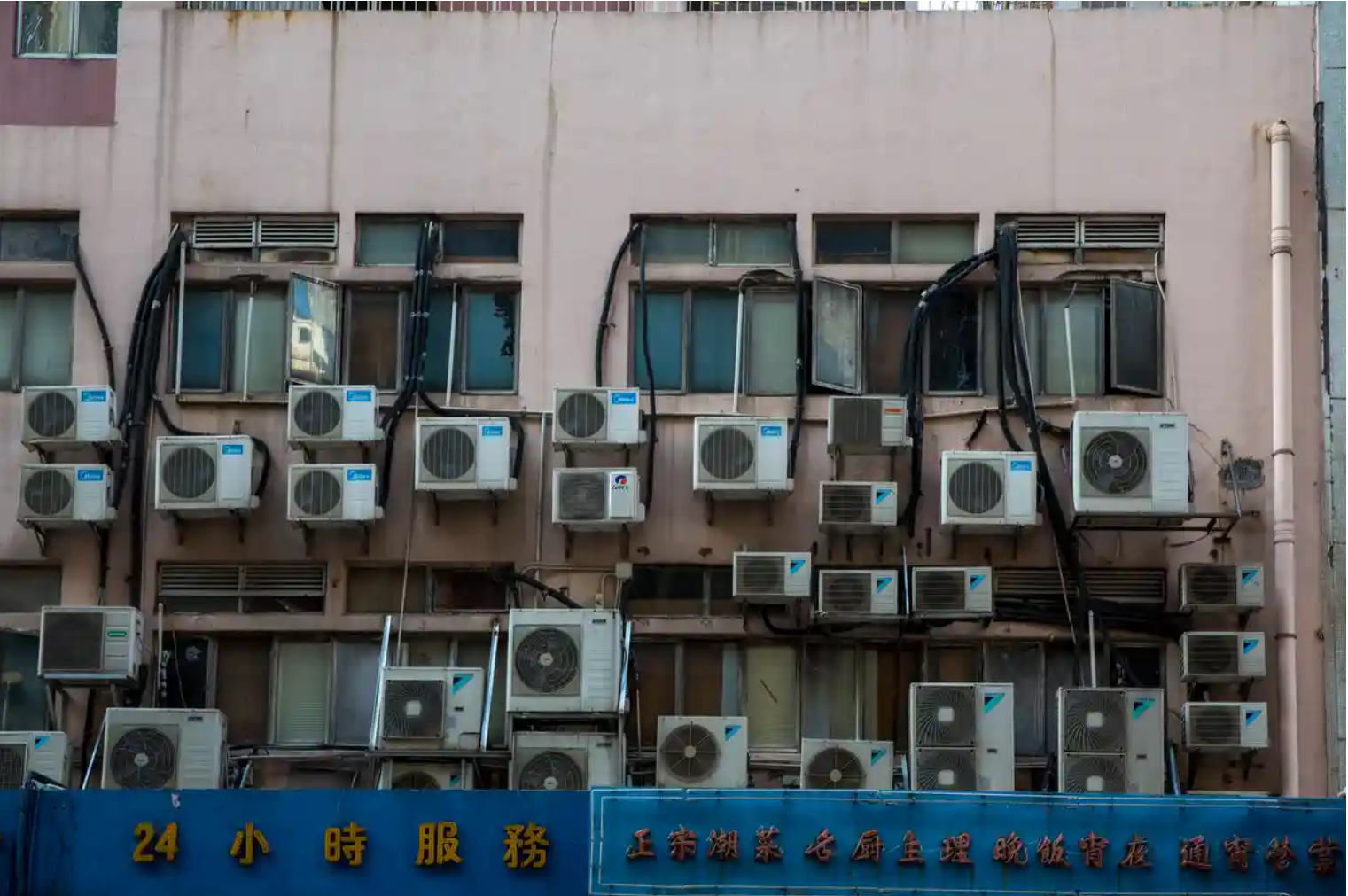Sweating For Our Grandchildren!

(Image 1)
“Wall-mounted air conditioning units in Hong Kong. Photograph: Andrew Aitchison/In Pictures via Getty Images” Published in The Guardian on August 29, 2019.
By Matthew Cohen Written: September 9, 2021
Air Conditioning may relieve the intense temperatures in the summer, but ultimately it’s just making the planet hotter. The hotter it gets, the more people use AC. And the more they use AC, the hotter it keeps getting. It is an ongoing cycle, and if we don’t stop the trend of relying on air-conditioning, and go back to our roots, this generation’s grandchildren will have an increasingly worse environment.
Why Air Conditioning Is Bad For the Environment.
Air conditioning has harmful and negative impacts on the environment. AC used to use a cooling agent called CFCs (chlorofluorocarbons). CFCs are the most harmful cooling agents that ACs have used. They participate immensely in breaking down the ozone layer which protects us from the dangerous rays of the sun. Fortunately, according to NASA, “Under the auspices of the Montreal Protocol treaty signed in 1987, CFCs were officially phased out of production worldwide in 2010.” So after that, HFCs (hydrofluorocarbons) were substituted for CFCs. Besides for being a strong greenhouse gas, HFCs also have negative effects on the ozone layer. Although its involvement in ozone depletion is lower than CFCs, in a recent study scientists discovered that HFCs indirectly effect the ozone layer. NASA said that, “HFC emissions cause increased warming of the stratosphere, speeding up the chemical reactions that destroy ozone molecules.”
How People of Other Times and Cultures Have Stayed Cool Without AC.
Ancient Romans would build their buildings so that the windows would face away from the sun, and wind could come into the building, cooling it down. Romans as well as Native Americans would dig trenches under their dwellings or buildings, and the evaporation of the water would cool the air.
(Image 2)
Egyptians and Native Americans would also place wet towels above doors, and the evaporation of the water would cool the air. Many cultures would dig their communities into rocks and canyons to shade themselves from the sun.
(Image 3)
A Whole Summer Without Air-Conditioning!
My family didn’t use AC for the whole summer this year. We used fans, curtains, and even bed sheets to keep our house cold enough. Yes we sweated, and yes we were tempted to quit (by no means, should this be romanticized), but we decided that the cause was more important than our comfort.
When the sun came out and the day got hotter we would close all the windows, put curtains or bed sheets over the windows, and would sometimes escape to the basement – where the dehumidifier was. In the evening, when it’s cooling down outside, we would open all the windows up again, put the fans on, and let the non-artificial, fresh, cold air rush into the house like a cure.
Conclusion.
If you would be in danger of having a heat stroke, or getting sick, do not attempt this. But if you are in a place where this is possible, I do encourage you to attempt this for as long as you think you can endure this physical and mental challenge that my family calls Sweating For Our Grandchildren.
Please, show this to anyone you think would be up for the challenge.
Sources
Retrieved from https://www.nasa.gov/press-release/goddard/nasa-study-shows-that-common-coolants-contribute-to-ozone-depletion.
Retrieved From https://knowledgestew.com/the-worlds-first-air-conditioning-or/. Daniel Ganninger, June 24, 2021, The Knowledge Stew.
(Image 1) Retrieved from https://www.theguardian.com/environment/2019/aug/29/the-air-conditioning-trap-how-cold-air-is-heating-the-world. Stephen Buranyi, August 29, 2019, The Gaurdian.
(Image 2) Retrieved from https://knowledgestew.com/wp-content/uploads/2014/12/Wind-Tower-and-Qanat-Cooling-1.jpg.
(Image 3) Retrieved from https://knowledgestew.com/wp-content/uploads/2021/06/Anasazi.jpg.

